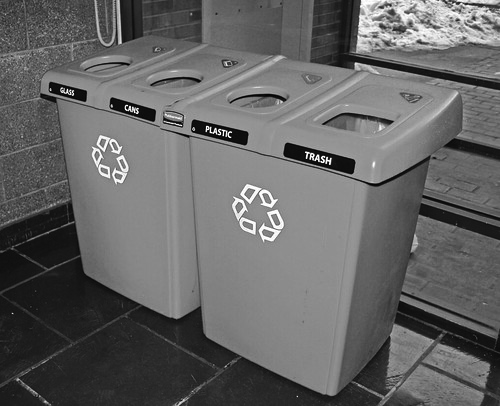
Last Wednesday, the Office of Sustainability and members of the community gathered to celebrate the beginning of the national competition.
The swish of the silver pom-poms could hardly be heard over the deep vibrato of the announcer’s voice. “The Temple Owls are in the building.” he said as the Diamond Gems bobbed to the music and Hooter T. Owl posed for pictures. The clangor and the commotion filled the ears of every person in the room, but a few familiar sounds were noticeably absent. There was no squeak of sneakers against a polished hardwood court, nor any rhythmic basketball bounces.
On Jan. 25 when members of the Temple community gathered together it was not for a basketball game, but for a very different type of competition: Recyclemania.
Recyclemania is an eight-week-long competition, involving more than 500 colleges and universities throughout Canada and the United States, to determine which school can recycle the most and waste the least.
Last year, Temple placed first in the Atlantic Ten division for the highest gross tonnage of recyclables, as well as first place in the waste minimization category for the lowest cumulative waste per person. In the end, this amounted to a grand total of 414,640 pounds of recyclables and 46.51 pounds per person of waste collected.
This year, Temple strives to clock in an even better performance by recycling approximately 415,000 pounds and defending its first place titles.
Under the leadership of the Office of Sustainability, the university has developed a series of strategies in order to successfully obtain these goals.
The first of which is a paper purge initiative, encouraging professors to clear their offices of piles of old papers. In today’s age of digitalization, filing cabinets overflowing with paper have nearly become obsolete and serve no other purpose than to provide an additional source of clutter. The College of Education has even made a game out of it, entering anyone who participates into a raffle for a new iPhone or Kindle.
Another way the Office of Sustainability is seeking to spread awareness of Recyclemania is through student outreach programs, including the pep rally that was held in the Student Center last Wednesday, Jan. 25. The pep rally included members of Temple Student Government, Temple Dining Services, Temple Athletics and Residential Life.
Jim Poole from the Office of Residential Life was there handing out free reusable water bottles and encouraging students to take advantage of the 24 water refilling stations on Main Campus.
“This country consumes so many plastic water bottles that our recycling plants simply cannot keep up,” Poole said.
According to the Clean Air Council, bottled water consumption in the United States more than doubled between 1997 and 2007, rising from 13.4 gallons per person to 29.3 gallons per person. This creates a sizable environmental concern because the production of plastic bottles is energy intensive. In order to produce all of the water bottles consumed in the U.S in one year the energy equivalent of 50 million barrels of oil is used.
Erin Kim, a student worker at Residential Life, explained that there is virtually no downside to making the switch to reusable water bottles.
“They are better for the environment and cheaper than plastic bottles,” she said.
The filtered water from the stations is also of the same or better quality than is the water from a bottle. According to a report commissioned by the Environmental Working Group, entitled the Bottled Water Scorecard, 18 percent of bottled waters refuse to list the location of their source and 32 percent fail to reveal information about the treatment or purity of their water.
Freshman biochemistry major Amanda Wakefield said she noticed the water refilling stations around Main Campus and wishes that there were more available.
“I try and recycle everything that I can, but I haven’t really been able to use the refilling stations because there aren’t any in the buildings where I have class,” Wakefield said.
Residential life is trying to stop this problem by encouraging students to hang posters spreading awareness of the “free water” on Main Campus and to directly ask the university for more stations.
During the next two months, additional events will be held related to the competition, including the Recyclemania Kickoff, which will be held at the men’s basketball game on Feb. 1. Cherry and White members will receive a Recyclemania T-shirt and the game will feature a variety of recycling promotions.
Kathleen Grady, sustainability coordinator for the Office of Sustainability, said she hopes all of these Recyclemania outreach efforts will help to raise awareness of waste management and the effect that waste has on the climate.
“Two to 3 percent of the green house gases produced by Temple comes from solid waste,” Grady said. “Recyclemania is a good first way to get students starting to think about the broader issues of climate change. Climate change is a very large and complicated issue. Recyclemania breaks it down a bit and gives them something tangible to wrap their heads around.”
Amy Stansbury can be reached at amy.stansbury@temple.edu.


Be the first to comment